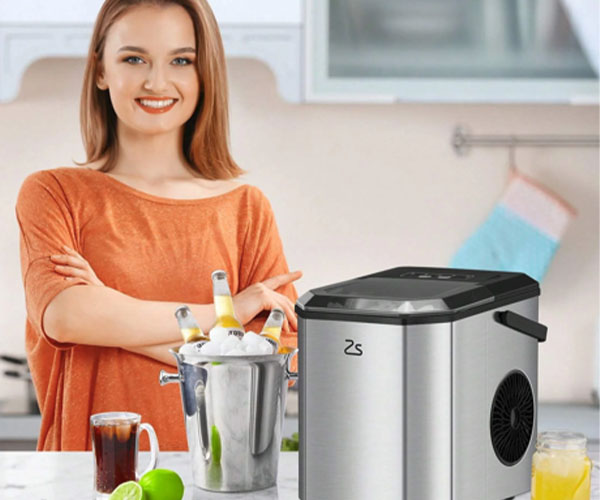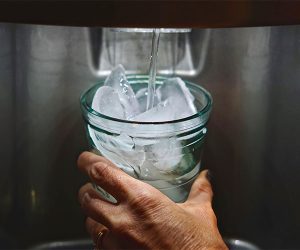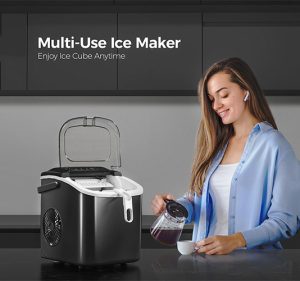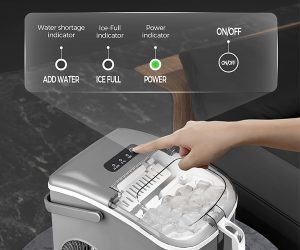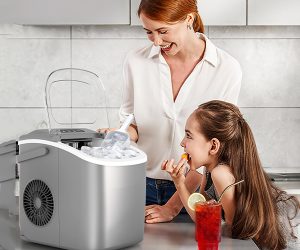Introduction
Owning a nugget ice maker countertop unit can be a game-changer for those who love the soft, chewable texture of nugget ice. However, like any appliance, these ice makers can occasionally run into problems. Knowing how to troubleshoot common issues can save you time, money, and the hassle of professional repairs. In this guide, we’ll cover some DIY tips to help you keep your ice maker running smoothly.
Understanding Your Ice Maker Nugget Countertop
Before diving into troubleshooting, it’s essential to understand the basic components and operation of your ice maker nugget countertop. These machines typically consist of:
- Water Reservoir: The container where water is stored before being converted into ice.
- Ice-Making Unit: The mechanism that freezes the water and forms it into nugget ice.
- Storage Bin: Where the ice is stored after being made.
Understanding these parts will help you identify where problems may arise and how to address them effectively.
Common Issues and DIY Troubleshooting Tips
Ice Maker Not Producing Ice
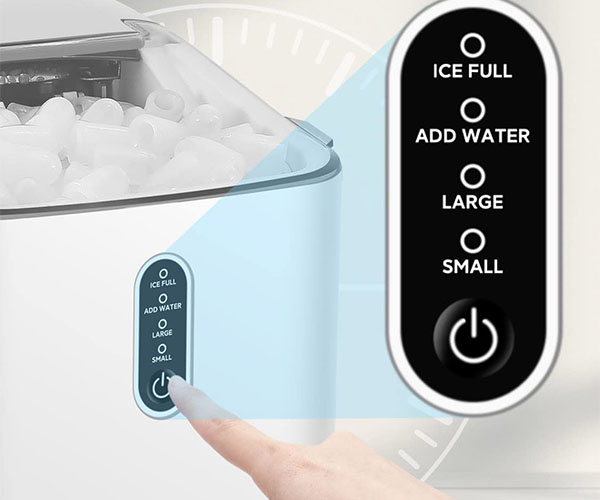
If your ice maker nugget countertop is not producing ice, consider these potential causes and solutions:
- Power Supply Issues: Ensure the machine is plugged in and receiving power. Check the power cord for any damage.
- Water Supply Problems: Verify that the water reservoir is filled and that the water supply line is not blocked or kinked.
- Ice-Making Unit Malfunction: If the unit is not freezing water, the issue could be with the compressor or cooling system. Try resetting the machine according to the manufacturer’s instructions.
Poor Ice Quality
If the ice produced is of poor quality, such as being cloudy or off-tasting, consider the following tips:
- Water Quality: Use filtered or distilled water to prevent mineral buildup and improve ice clarity.
- Regular Cleaning: Clean the water reservoir and ice bin regularly to remove any impurities or bacteria that could affect ice quality.
- Descaling: Periodically descale the machine to prevent mineral deposits from affecting the ice-making process.
Ice Maker Making Noise
Unusual noises from your ice maker nugget countertop can be alarming. Here are some common causes and solutions:
- Vibrations: Ensure the machine is placed on a level surface to prevent vibrations.
- Loose Parts: Check for any loose screws or components that may need tightening.
- Cooling Fan Issues: The cooling fan can become noisy if clogged with dust or debris. Clean the fan to ensure smooth operation.
Ice Maker Leaking Water
Water leaks can be a significant issue, but they are often easy to fix.
- Water Reservoir Overfill: Ensure you are not overfilling the water reservoir. Most machines have a maximum fill line.
- Blocked Drain: Check the drain line for any blockages that may be causing water to overflow.
- Damaged Seals: Inspect seals and gaskets for any signs of wear or damage. Replace them if necessary.
Preventative Maintenance Tips
To keep your ice maker nugget countertop running smoothly, follow these preventative maintenance tips:
- Regular Cleaning: Clean the water reservoir, ice bin, and all removable parts at least once a week.
- Descaling: Descale the machine monthly to prevent mineral buildup.
- Check for Wear and Tear: Regularly inspect the machine for any signs of wear and tear, such as frayed cords or damaged components.
- Use Quality Water: Always use filtered or distilled water to prevent impurities from affecting the ice quality and machine performance.
Conclusion
By following these DIY troubleshooting tips and maintaining your ice maker nugget countertop regularly, you can ensure it continues to produce high-quality nugget ice for years to come. Regular maintenance not only extends the life of your appliance but also enhances the overall ice-making experience. If you encounter issues beyond these common problems, consulting the manufacturer’s guide or seeking professional help may be necessary.
Remember, a well-maintained ice maker is key to enjoying perfect nugget ice every time!
Understanding Your Nugget Ice Maker
Nugget ice makers, often referred to as ice maker nugget countertop devices, have become increasingly popular for their ability to produce soft, chewable ice that is perfect for a variety of beverages. Understanding how these machines work and their key components is essential for effective maintenance and ensuring a long lifespan for your appliance.
How It Works
A nugget ice maker operates through a series of well-coordinated processes that transform water into the beloved nugget ice. Here’s a breakdown of the general operation:
- Water Intake: The machine begins by drawing water from the reservoir. It is essential to use filtered water to prevent mineral buildup and ensure the quality of the ice.
- Freezing Process: The water is then pumped into the freezing cylinder where it is rapidly chilled. Unlike traditional ice makers that freeze water in cubes, nugget ice makers use a cylindrical or barrel-shaped freezing method.
- Compression: As the water freezes, it forms thin layers of ice that are scraped off and compressed into small nuggets. This compression process gives the ice its unique chewable texture.
- Dispensing: The formed ice nuggets are then pushed into the storage bin, ready for use. Many ice maker nugget countertop models include a scoop or an automatic dispensing system for convenience.
Key Components
To keep your nugget ice maker in top condition, it’s helpful to understand its main components and their roles:
- Water Reservoir: Holds the water that will be converted into ice. It is crucial to keep this component clean to avoid contamination.
- Freezing Cylinder: The part of the machine where water is frozen and formed into nuggets. Regular cleaning is necessary to prevent ice buildup.
- Compressor: Powers the freezing process. Ensuring proper ventilation around the compressor can help maintain its efficiency.
- Ice Storage Bin: Collects and stores the nugget ice. It is typically insulated but not refrigerated, so the ice should be used promptly or stored in a separate freezer.
- Water Pump: Circulates water from the reservoir to the freezing cylinder. Keeping the pump and its filters clean ensures consistent water flow and ice production.
Benefits of Nugget Ice Makers
Understanding the benefits of your ice maker nugget countertop can help you appreciate why regular maintenance is worth the effort:
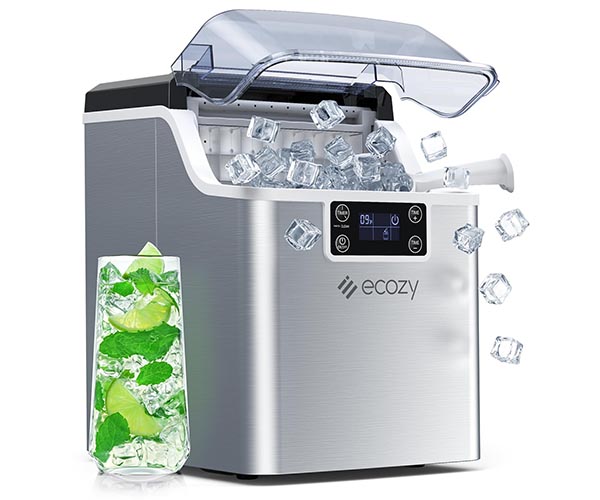
- Chewable Ice Texture: Nugget ice is softer and more chewable than traditional cubed ice, making it ideal for a variety of drinks, including cocktails, soft drinks, and smoothies.
- Rapid Ice Production: These machines can produce ice quickly, often within minutes, which is perfect for entertaining guests or meeting high-demand situations.
- Compact Design: Many nugget ice makers are designed to fit comfortably on countertops, making them convenient for home kitchens, offices, and small commercial spaces.
- Versatility: Beyond beverages, nugget ice can be used in food presentation, healthcare settings for soothing injuries, and more.
Maintenance Importance
Regular maintenance of your nugget ice maker is crucial for several reasons:
- Prolongs Lifespan: Routine cleaning and care can extend the life of your machine, ensuring it continues to perform efficiently.
- Ensures Ice Quality: Regular maintenance helps prevent the buildup of impurities that can affect the taste and texture of the ice.
- Prevents Breakdowns: By keeping the components clean and in good working order, you reduce the risk of malfunctions and costly repairs.
In the following sections, we will delve deeper into specific maintenance tips, providing you with a comprehensive guide to keep your ice maker nugget countertop in optimal condition. From daily cleaning routines to troubleshooting common issues, you’ll learn everything you need to ensure your machine consistently produces high-quality nugget ice.
Common Issues and DIY Solutions
Maintaining your ice maker nugget countertop is crucial for ensuring it runs smoothly and efficiently. However, even with regular maintenance, you might encounter some common issues. Understanding these problems and knowing how to address them can save you time and money. Here are some typical problems you might face with your nugget ice maker and their DIY solutions:
1. The Ice Maker Isn’t Producing Ice
If your ice maker nugget countertop isn’t producing ice, it can be frustrating, especially during hot weather or when you have guests. Here are some potential causes and solutions:
- Power Supply Issues: Ensure the ice maker is properly plugged into a functioning electrical outlet. Check the power cord for any signs of damage. If the unit still doesn’t turn on, try plugging it into a different outlet to rule out a faulty power source.
- Water Supply Problems: Confirm that the water reservoir is filled with clean, filtered water. Sometimes, mineral deposits or impurities can block water flow. Clean the reservoir thoroughly and check the water line for any obstructions.
- Clogged Water Filter: If your ice maker has a built-in water filter, it might be clogged. Refer to your user manual on how to replace or clean the filter. Regular maintenance of the water filter can prevent such issues.
2. The Ice Maker Is Producing Small or Misshapen Ice Nuggets
When your ice nuggets are smaller than usual or have irregular shapes, it can indicate several underlying problems:
- Incorrect Water Level: Ensure the water level in the reservoir is correct. Too little water can result in smaller ice nuggets. Add more water and see if the size of the ice improves.
- Dirty Evaporator Plate: The evaporator plate is where the ice forms. If it’s dirty, it can affect the shape and size of the ice nuggets. Clean the evaporator plate following the manufacturer’s instructions.
- Temperature Settings: The ambient temperature around your ice maker can affect ice production. Ensure the machine is in a cool area away from direct sunlight and other heat sources.
3. The Ice Maker Is Leaking Water
Water leaks are a common issue with nugget ice makers and can lead to serious damage if not addressed promptly.
- Check the Water Reservoir: Make sure the water reservoir is seated correctly. A misaligned reservoir can cause leaks. Remove and reseat the reservoir securely.
- Inspect Water Lines: Look for any cracks or loose connections in the water lines. Tighten any loose connections and replace damaged lines.
- Drain Plug Issues: Some ice makers have a drain plug that can become loose or damaged. Ensure the drain plug is secure and not cracked.
4. The Ice Maker Is Making Noise
Unusual noises from your ice maker nugget countertop can be a sign of several issues:
- Fan Issues: The fan helps cool the machine and can accumulate dust and debris over time. Clean the fan blades and ensure there are no obstructions.
- Compressor Problems: The compressor may make noise if it’s working too hard. Ensure the ice maker has adequate ventilation and isn’t overheating.
- Loose Parts: Check for any loose screws or components that might be vibrating during operation. Tighten any loose parts to reduce noise.
5. The Ice Maker Has a Bad Odor
If your ice maker develops an unpleasant smell, it can affect the taste of your ice:
- Regular Cleaning: Regularly clean the interior of your ice maker, including the water reservoir, ice bin, and evaporator plate. Use a mixture of warm water and vinegar or a mild cleaning solution.
- Air Filters: Some ice makers have air filters that can trap odors. Check and replace the air filter if necessary.
- Proper Storage: When not in use, leave the lid slightly open to allow air circulation, preventing mold and mildew buildup.
6. The Ice Maker Is Not Dispensing Ice
If your ice maker produces ice but doesn’t dispense it, the problem might be mechanical:
- Ice Jam: Sometimes, ice can get stuck in the chute or dispenser. Carefully remove any jammed ice with a plastic utensil.
- Dispenser Motor Issues: The motor that drives the dispenser might be malfunctioning. Check if the motor is running and replace it if necessary.
- Control Board Problems: The control board may fail, preventing the dispenser from working. Consult your manual or a professional for repair or replacement.
Regular maintenance and prompt troubleshooting can keep your ice maker nugget countertop running efficiently. By addressing these common issues yourself, you can save on repair costs and ensure you always have a steady supply of perfect ice nuggets.
Preventative Maintenance Tips
Proper maintenance of your ice maker nugget countertop appliance is crucial to ensure it operates efficiently and has a long lifespan. Here are some detailed preventative maintenance tips to keep your nugget ice maker in top condition:
- Regular Cleaning:
- Clean the exterior and interior surfaces of the ice maker nugget countertop regularly to prevent the buildup of dirt and grime. Use a mild detergent and a soft cloth to wipe down the surfaces.
- Pay special attention to the water reservoir and the ice bin, as these areas are prone to mold and mildew if not cleaned properly.
- Descaling:
- Hard water can lead to mineral buildup inside your ice maker. Descaling the machine at least once a month is essential to prevent this. Use a commercial descaling solution or a mixture of vinegar and water.
- Follow the manufacturer’s instructions for descaling to avoid damaging the appliance. After descaling, run a few cycles with clean water to rinse out any residue.
- Filter Maintenance:
- If your ice maker nugget countertop has a water filter, replace it according to the manufacturer’s recommendations. A clean filter ensures that the ice produced is free from impurities and tastes fresh.
- Inspect the filter regularly and clean it if it’s reusable. This will help maintain the efficiency of the ice maker and the quality of the ice.
- Ventilation:
- Ensure that the ice maker has adequate ventilation. Check that the vents are not blocked by dust or debris, as this can cause the machine to overheat and reduce its efficiency.
- Clean the vents periodically using a vacuum or a brush to remove any accumulated dust.
- Inspect for Leaks:
- Regularly inspect your ice maker nugget countertop for any signs of leaks. Check the water supply lines and connections to ensure they are secure and not damaged.
- Address any leaks immediately to prevent water damage and ensure the ice maker continues to operate correctly.
- Monitor Ice Quality:
- Pay attention to the quality of the ice produced by your machine. If the ice appears cloudy or has an unusual taste, it may be time to clean the machine more thoroughly or replace the water filter.
- Regularly check the size and shape of the ice nuggets. Consistent changes in ice quality can indicate a problem that needs to be addressed.
- Professional Servicing:
- Consider having your ice maker nugget countertop serviced by a professional annually. A technician can perform a thorough inspection and maintenance, ensuring that all components are functioning correctly.
- Professional servicing can help identify and address potential issues before they become significant problems, extending the life of your appliance.
- Create a Maintenance Schedule:
- Establish a regular maintenance schedule for your ice maker nugget countertop. Keeping a checklist of tasks and their frequency can help you stay on top of maintenance.
- Stick to the schedule diligently to ensure your ice maker remains in optimal condition.
By following these preventative maintenance tips, you can ensure that your ice maker nugget countertop appliance operates efficiently, produces high-quality ice, and has a long lifespan. Regular maintenance not only helps in preventing unexpected breakdowns but also enhances the overall performance of the ice maker. Remember, a well-maintained ice maker is essential for enjoying perfect nugget ice every time.
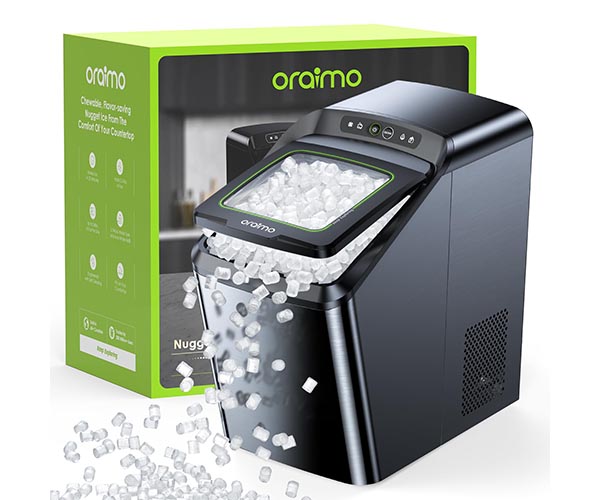
When to Seek Professional Help
Knowing when to seek professional help for your ice maker nugget countertop can save you time, frustration, and potential damage to your appliance. While regular maintenance can address many common issues, certain situations call for the expertise of a professional technician. Here are some scenarios where professional assistance is recommended:
Persistent Performance Issues
If your ice maker nugget countertop consistently underperforms despite regular maintenance, it may be time to call in a professional. Persistent issues could indicate underlying problems that require specialized tools and knowledge to diagnose and repair. Common signs of persistent performance issues include:
- Slow Ice Production: If your machine takes significantly longer to produce ice than it used to,.
- Inconsistent Ice Quality: If the ice is not forming correctly, is too soft, or has an unusual texture,.
- Frequent Breakdowns: If your ice maker frequently stops working or needs constant resetting,.
Electrical Problems
Dealing with electrical components can be dangerous if you’re not properly trained. If you notice any of the following electrical issues, it’s best to seek professional help:
- Unusual Noises: Strange sounds such as buzzing, clicking, or humming can indicate electrical problems.
- Power Surges: If your ice maker experiences power surges or frequently trips your circuit breaker,.
- Burning Smell: Any odor of burning plastic or wiring should be addressed immediately by a professional.
Water Leakage
Water leakage is a common issue that can lead to more severe problems if not addressed promptly. Signs of water leakage include:
- Puddles Around the Ice Maker: If you consistently find water around the base of your ice maker nugget countertop,.
- Dripping: Continuous dripping from the water inlet or other parts of the machine.
- Corrosion: Signs of rust or corrosion on the exterior or interior components of the ice maker.
Faulty Components
Over time, certain components of your ice maker may wear out or become damaged. If you suspect that a part is faulty, it’s crucial to have a professional inspect and replace it. Common faulty components include:
- Compressor Issues: If the compressor is not functioning correctly, your ice maker won’t produce ice efficiently.
- Thermostat Problems: A malfunctioning thermostat can lead to improper temperature regulation, affecting ice production.
- Water Pump Failures: The water pump is essential for circulating water through the system. If it’s not working, ice production will be impaired.
Unusual Ice Taste or Odor
If your ice starts to develop an unusual taste or odor, this could indicate a deeper issue within the machine. While cleaning can often resolve this problem, persistent issues might require professional attention:
- Chemical Smell: A chemical odor can be a sign of contaminated water lines or a need for a thorough internal cleaning.
- Metallic Taste: This could indicate corrosion within the machine or issues with the water supply.
Error Codes
Modern ice maker nugget countertop machines often come with digital displays that show error codes when something goes wrong. If you see an error code that you don’t understand, consult the user manual. If the manual doesn’t resolve the issue, it’s time to call a professional. Common error codes might indicate:
- Sensor Failures: Problems with temperature or water level sensors.
- Blocked Water Lines: Indications that water flow is restricted, which can affect ice production.
Preventive Inspections
Even if your ice maker appears to be functioning well, scheduling regular preventive inspections can help catch potential issues before they become major problems. A professional technician can:
- Perform Comprehensive Cleaning: Including areas that are hard to reach on your own.
- Check for Wear and Tear: Inspecting parts that might be close to failing.
- Update Firmware: Ensuring that any digital components are running the latest software for optimal performance.
In summary, while regular maintenance can keep your ice maker nugget countertop running smoothly, knowing when to seek professional help is crucial for addressing more complex issues. By recognizing the signs of serious problems and acting promptly, you can extend the lifespan of your appliance and ensure it continues to provide the high-quality ice you enjoy.
Enhancing the Lifespan of Your Nugget Ice Maker
Ensuring your ice-maker nugget countertop stays in prime condition requires a blend of regular maintenance, smart usage habits, and timely troubleshooting. By following the tips outlined below, you can significantly extend the lifespan of your machine and keep it running efficiently.
Regular Maintenance Schedule
Establishing a regular maintenance schedule is crucial for the longevity of your ice maker nugget countertop. Consistent care helps prevent the build-up of scale and other deposits, which can impair the machine’s functionality over time.
- Daily Cleaning:
- Wipe down surfaces: Use a soft, damp cloth to clean the exterior and interior surfaces. This removes any spills or residue that could affect performance.
- Empty the ice bin: Regularly emptying the ice bin prevents ice from clumping and ensures your machine produces fresh, high-quality ice.
- Weekly Tasks:
- Deep clean: Once a week, perform a deeper clean by removing and washing removable parts with warm, soapy water.
- Descaling: Use a descaling solution to remove mineral build-up from the internal components. Follow the manufacturer’s instructions for the best results.
- Monthly Maintenance:
- Inspect filters: Check and clean or replace water filters as needed. Clean filters ensure your machine operates efficiently and produces pure ice.
- Lubricate moving parts: Apply food-safe lubricant to any moving parts to keep them operating smoothly and prevent wear and tear.
Smart Usage Habits
In addition to regular maintenance, how you use your ice maker nugget countertop can also impact its lifespan. Implementing smart usage habits can prevent unnecessary strain on the machine.
- Use filtered water: Always use filtered or distilled water in your ice maker. This reduces the amount of mineral deposits that can build up inside the machine.
- Avoid overloading: Don’t overfill the ice bin or water reservoir. Overloading can strain the machine and cause it to malfunction.
- Proper placement: Ensure your ice maker is placed on a stable, level surface with adequate ventilation. Avoid placing it near heat sources or in direct sunlight.
Troubleshooting Common Issues
Being proactive in troubleshooting can save you time and money in the long run. Here are some common issues and how to address them:
- Machine not making ice:
- Check the water supply. Ensure the water reservoir is filled and the water line is properly connected.
- Inspect for blockages: Look for any ice blockages in the machine that might be preventing it from producing ice.
- Ice quality issues:
- Clean the machine: Poor ice quality is often due to a dirty machine. Perform a thorough cleaning.
- Adjust the water: Make sure you are using the right type of water. Hard water can lead to cloudy or poor-quality ice.
FAQs
How do you troubleshoot a countertop ice maker?
Troubleshooting a countertop ice maker involves a few key steps to identify and resolve common issues:
- Check the Power Supply:
- Ensure the ice maker is properly plugged in.
- Check the circuit breaker or fuse box to make sure the outlet is functioning.
- Inspect the Water Supply:
- Verify that the water reservoir is filled with the appropriate amount of water.
- Ensure the water line is connected correctly and is not kinked or blocked.
- Clean the Machine:
- Regularly clean the ice maker to prevent build-up of minerals and other residues.
- Descale the machine using a descaling solution as per the manufacturer’s instructions.
- Check for Blockages:
- Look for any ice blockages that might be obstructing the ice-making process.
- Clear any obstructions in the ice chute or bin.
- Inspect for Mechanical Issues:
- Ensure all parts are properly assembled and nothing is loose or out of place.
- Listen for unusual noises that could indicate mechanical issues.
- Refer to the User Manual:
- Consult the user manual for specific troubleshooting steps for your model.
How do I troubleshoot my ice maker?
To troubleshoot your ice maker, follow these general steps:
- Power and Water Supply:
- Ensure the ice maker is plugged in and the power outlet is working.
- Check that the water reservoir is full and that the water supply line is not blocked.
- Cleanliness:
- Regularly clean the ice maker to remove any debris or mineral build-up.
- Descale the ice maker periodically to maintain its efficiency.
- Component Check:
- Check all components for proper assembly and any signs of wear or damage.
- Ensure the ice bin is not overfilled and that the ice-making unit is not blocked.
- Temperature Settings:
- Verify that the temperature settings are correct for optimal ice production.
- Manufacturer’s Guidelines:
- Follow the troubleshooting steps provided in the user manual specific to your model.
Why is my Opal Nugget ice maker not making ice?
If your Opal Nugget ice maker is not making ice, consider the following troubleshooting steps:
- Power Issues:
- Ensure the ice maker is plugged in and the power outlet is functioning.
- Water Supply:
- Check if the water reservoir is filled and the water filter is not clogged.
- Cleanliness:
- Clean and descale the ice maker to remove any build-up that might be hindering ice production.
- Reset the Machine:
- Try resetting the ice maker as per the instructions in the user manual.
- Mechanical Problems:
- Listen for any unusual noises that might indicate mechanical issues and consult a professional if needed.
What is the life expectancy of a countertop ice maker?
The life expectancy of a countertop ice maker generally ranges from 5 to 10 years. This can vary based on several factors:
- Usage: Frequent use can lead to wear and tear, potentially shortening the lifespan.
- Maintenance: Regular cleaning and maintenance can significantly extend the life of the machine.
- Quality: Higher-quality machines from reputable brands tend to last longer.
Is it worth fixing an ice maker?
Whether it is worth fixing an ice maker depends on several factors:
- Cost of Repair vs. Replacement: If the cost of repair is close to or exceeds the cost of a new machine, replacement might be more economical.
- Age of the Machine: Older machines might not be worth repairing if they are near the end of their expected lifespan.
- Severity of the Issue: Minor issues and routine maintenance are usually worth fixing, while major mechanical problems might not be.
Should you leave your countertop ice maker on all the time?
Leaving your countertop ice maker on all the time can be beneficial, but it also depends on usage patterns.
- Convenience: Keeping the ice maker on ensures a constant supply of ice, which is convenient for frequent use.
- Energy Consumption: Continuous operation can lead to higher energy consumption. Consider turning it off during periods of low use.
- Maintenance: Regular cleaning and maintenance are essential if the ice maker is left on continuously to prevent buildup and ensure efficiency.
Conclusion
Proper maintenance and troubleshooting are essential for ensuring the longevity and efficiency of your ice maker nugget countertop. Regular maintenance tasks, such as cleaning, descaling, and inspecting the machine, can prevent common issues and extend the machine’s lifespan. Adopting smart usage habits, such as using filtered water and avoiding overloading, can also help maintain optimal performance.
When troubleshooting, always start by checking the basics like power supply, water levels, and cleanliness. Refer to the user manual for specific instructions and consider professional servicing for persistent issues. Understanding common problems and their solutions can save you time and money in the long run.
Investing in a high-quality ice maker nugget countertop and following these guidelines can ensure you enjoy fresh, delicious nugget ice for years to come. Whether you decide to fix or replace an ice maker should depend on the cost, age, and severity of the issue. Additionally, leaving the machine on all the time can provide convenience but requires diligent maintenance to avoid potential drawbacks.
By implementing these maintenance tips and troubleshooting steps, you can keep your ice maker nugget countertop in excellent condition, ensuring a continuous supply of perfect nugget ice for all your needs.

